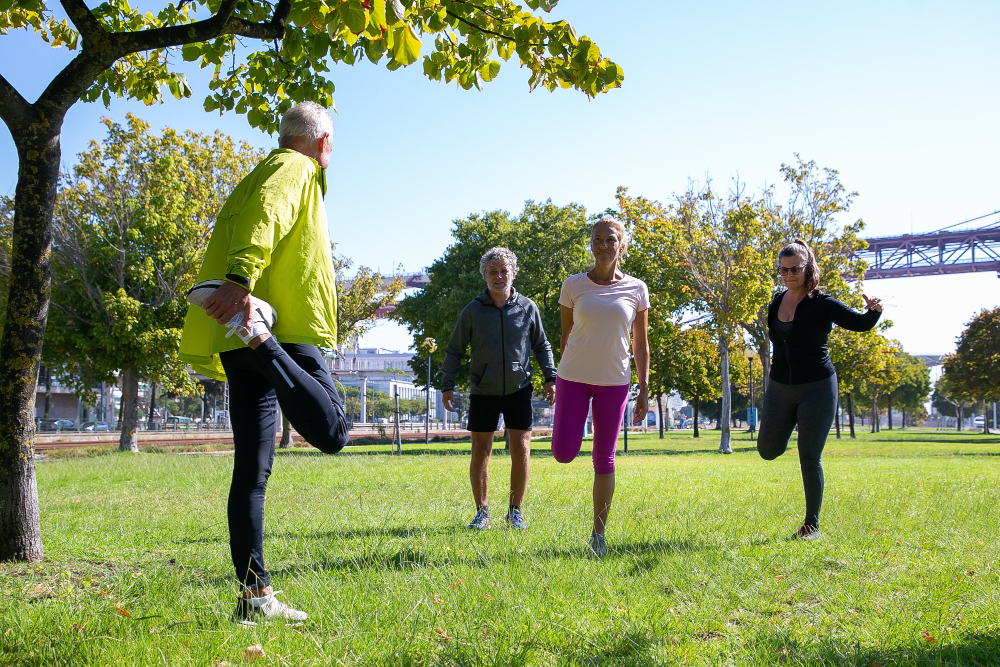The Best Exercises for Your Age Group

Exercise is important for people of all ages. It can help you maintain a healthy weight, reduce your risk of chronic diseases, improve your mood, and boost your energy levels. However, the best exercises for you will vary depending on your age and fitness level.
In this article, we will discuss the best exercises for people in different age groups. We will also provide tips on how to get started with an exercise program that is right for you.
Exercise for Children and Adolescents (6-17 years)
Children and adolescents need at least 60 minutes of moderate-to-vigorous physical activity every day. This can be broken down into shorter periods of time throughout the day.
Some examples of moderate-to-vigorous physical activity include:
- Running
- Swimming
- Biking
- Dancing
- Playing sports
It is important for children and adolescents to participate in a variety of physical activities to help them develop their motor skills and overall fitness.
Exercise for Adults (18-64 years)
Adults should aim for at least 150 minutes of moderate-intensity aerobic activity or 75 minutes of vigorous-intensity aerobic activity each week. They should also do muscle-strengthening activities that work all major muscle groups (legs, hips, back, abdomen, chest, shoulders, and arms) on two or more days a week.
Some examples of moderate-intensity aerobic activity include:
- Brisk walking
- Biking
- Swimming
- Dancing
- Playing sports
Some examples of vigorous-intensity aerobic activity include:
- Running
- Swimming laps
- Jumping rope
- Hiking
- Playing basketball
Exercise for Older Adults (65+ years)
Older adults should aim for at least 150 minutes of moderate-intensity aerobic activity or 75 minutes of vigorous-intensity aerobic activity each week. They should also do muscle-strengthening activities that work all major muscle groups (legs, hips, back, abdomen, chest, shoulders, and arms) on two or more days a week.
In addition to aerobic and strength training, older adults should also focus on balance and flexibility exercises. These exercises can help to prevent falls and injuries.
Some examples of balance exercises include:
- Standing on one leg
- Walking heel-to-toe
- Tai chi
- Yoga
Some examples of flexibility exercises include:
- Stretching your hamstrings
- Stretching your quadriceps
- Stretching your back
- Stretching your shoulders
Conclusion
Exercise is important for people of all ages. It can help you maintain a healthy weight, reduce your risk of chronic diseases, improve your mood, and boost your energy levels. The best exercises for you will vary depending on your age and fitness level.
If you are new to exercise, it is important to start slowly and gradually increase the intensity and duration of your workouts. You should also talk to your doctor before starting any new exercise program, especially if you have any health concerns.
FAQs
1. What are the benefits of exercise?
Exercise has many benefits for people of all ages, including:
- Weight management
- Reduced risk of chronic diseases such as heart disease, stroke, type 2 diabetes, and some types of cancer
- Improved mood
- Increased energy levels
- Stronger bones and muscles
- Better balance and coordination
- Reduced risk of falls and injuries
- Improved sleep
- Increased self-esteem
2. How much exercise do I need?
The amount of exercise you need each week varies depending on your age and fitness level. The Centers for Disease Control and Prevention (CDC) recommends that adults get at least 150 minutes of moderate-intensity aerobic activity or 75 minutes of vigorous-intensity aerobic activity each week. They also recommend that adults do muscle-strengthening activities that work all major muscle groups (legs, hips, back, abdomen, chest, shoulders, and arms) on two or more days a week.
Children and adolescents need at least 60 minutes of moderate-to-vigorous physical activity every day. This can be broken down into shorter periods of time throughout the day.
If you are new to exercise, it is important to start slowly and gradually increase the intensity and duration of your workouts. You should also talk to your doctor before starting any new exercise program, especially if you have any health concerns.
Read More: Exploring the Best of England’s Countryside











